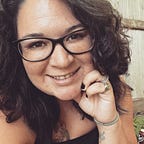What’s Wrong With Adoption?
I must have started at least five of these adoptee-themed posts, all different stories, ideas, thoughts. Noteworthy though they all might be, they don’t cut down to the core of why I’ve been going back and forth between the paper and the buzzing in my head lately.
I thought I would write about the story of my hair, the slow realization that I was some ethnic or racial identity that was never spoken about in my household. Or maybe I’d write about the Freudian themes in my novel, explain to readers what the deeper meaning is supposed to be. No, maybe I’d write instead about the imaginary friend I needed in fifth grade, the two alter-egos I created after my two big traumas afterward. And it isn’t that these things aren’t important to me; they are, and they may still get written about eventually.
But they all dance around the big idea without saying as much. What I’ve been trying to figure out how to say is simple: I’ve spent my life asking the question What’s wrong with me?
Am I a disappointment?
Is my hair wrong?
Is my head wrong?
Will I ever be good enough?
It’s been thirty years of this horrible question that won’t go away.
To my parents, this past year, I’ve been both apologetic and adamant. I can hardly express how much it pains me to speak with them about my adoption, my book, my experience as an adoptee. Yet I continue to do so despite all of our discomforts.
They are white Anglo-Saxon Protestant boomers who keep their emotions stuffed down all the way. As a teenager, the only way I knew how to prove to myself that they felt anything at all was to piss them off. Now we’re adults with nothing in common but my childhood, and it eats me up.
But I tell them things anyway. I tell them about my book, how it’s doing, my daughter, how she’s doing, my viewpoints, and I listen to their silences. The problem is that I desperately need them to say SOMETHING, but when they do, it’s never right.
I am currently in reunion or in the process of it, something I never thought I would have the courage to go through with. But I’ve known of my first mother and her struggles for forever and a day; I was just raised with so much fear that I accepted the distance. May she forgive me for hiding behind my fear. The truth is, I love her.
She may be hard to love, I don’t know yet, but so am I. So are you. We’re all hard to love, and loving isn’t supposed to be easy, is it?
Or maybe that’s the curse (or one of them) of being an adoptee. If you’re told enough times that you were loved so much, your own mother gave you up, you begin to equate loving with leaving. Is love abandonment? Is love keeping secrets? Is love actually control? Is love something I will never understand because of all these broken pieces inside of me?
What’s wrong with me?
I was on the phone with my parents and telling them about the recent events. I’d finally reached out to a biological relative and found a voice that felt so much like home it overwhelmed me. I began rambling and asking them questions to fill in the blanks of the new information I’d been gifted. I’m thirty years old and I still have questions. And then the conversation turned. We are fundamentally different in our viewpoints, beliefs, whatever the fuck you want to call them.
If they’re Christian, I’m atheist.
If they’re Republican, I’m Democrat.
If they’re quiet, I’m loud.
And I struck a nerve saying that because of my own personal biological history, my own lived history, I am pro-choice. I have always been pro-choice, and this is something that always confuses the pro-life people who think adoption is the ultimate solution. But it’s not.
“Adoption is trauma,” I say.
My mother responds, “I understand that you’re struggling with this, but it’s not. Not all adoptees are like you. I know several happy people who were adopted.”
We argue.
That’s not what this is about, you don’t know their inner-lives, maybe they’re in the fog. // No, they seem happy and they aren’t out talking about trauma, they’re fine. // Are you just gauging how fine they feel by how they behave? Are you just upset that I’m out here in the world saying that adoption is trauma? // All I’m saying is that other adoptees are happy and you should be, too.
Okay.
And we hang up. Both of us feel misunderstood and there’s nothing I’d love more than to guide my mother through her own pain so she could name it, sit with it, and move on. But I can’t and she won’t. So I don’t.
But I can’t help but wonder how long I have to go on like this, wishing for a love that was supposed to be unconditional, accepting tolerance instead. But now I know something I didn’t know before: it isn’t that there’s something wrong with me; I just haven’t been in the right place until now.
If you go your whole life being reprimanded for asking the wrong questions, for not acting grateful for every bread crumb, for choosing to believe different things, you will inherently feel wrong. Believe me, I know. Maybe the question ought to be:
What is wrong with adoption?
I don’t know what would have been different if things hadn’t played out this way. But this is how they turned out. Welcome to adoption.
But I do know that I will no longer seek validation from those who won’t give it. There is no better human on earth who will love me always and forever than the person writing this piece. And there isn’t a thing wrong with that.
